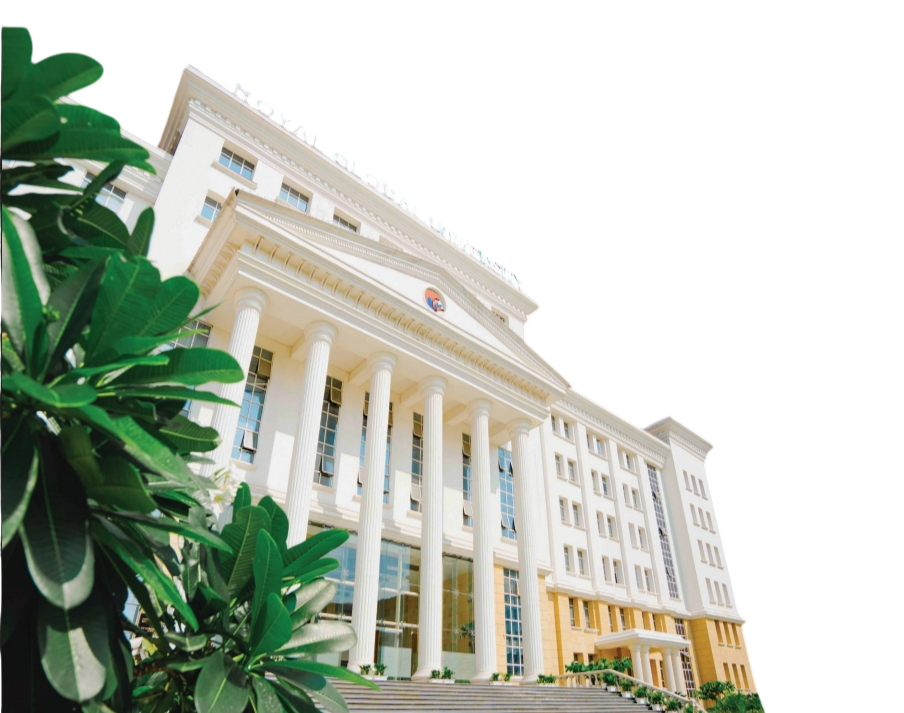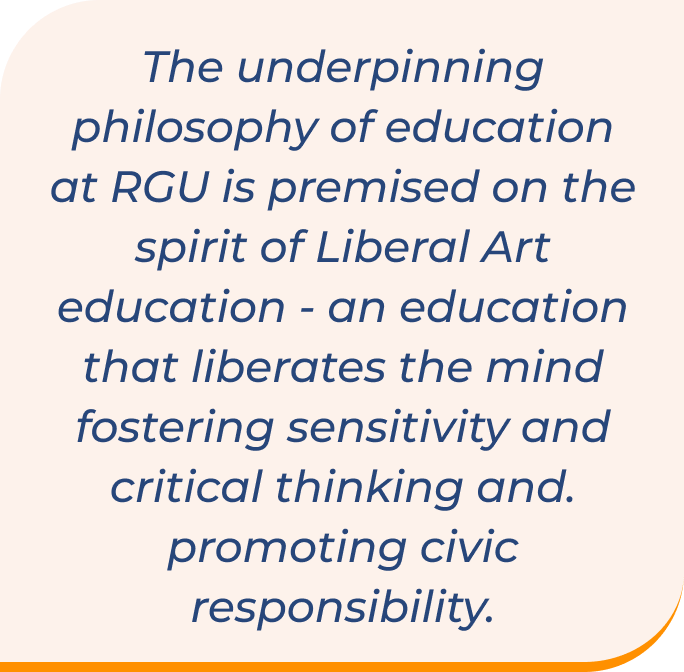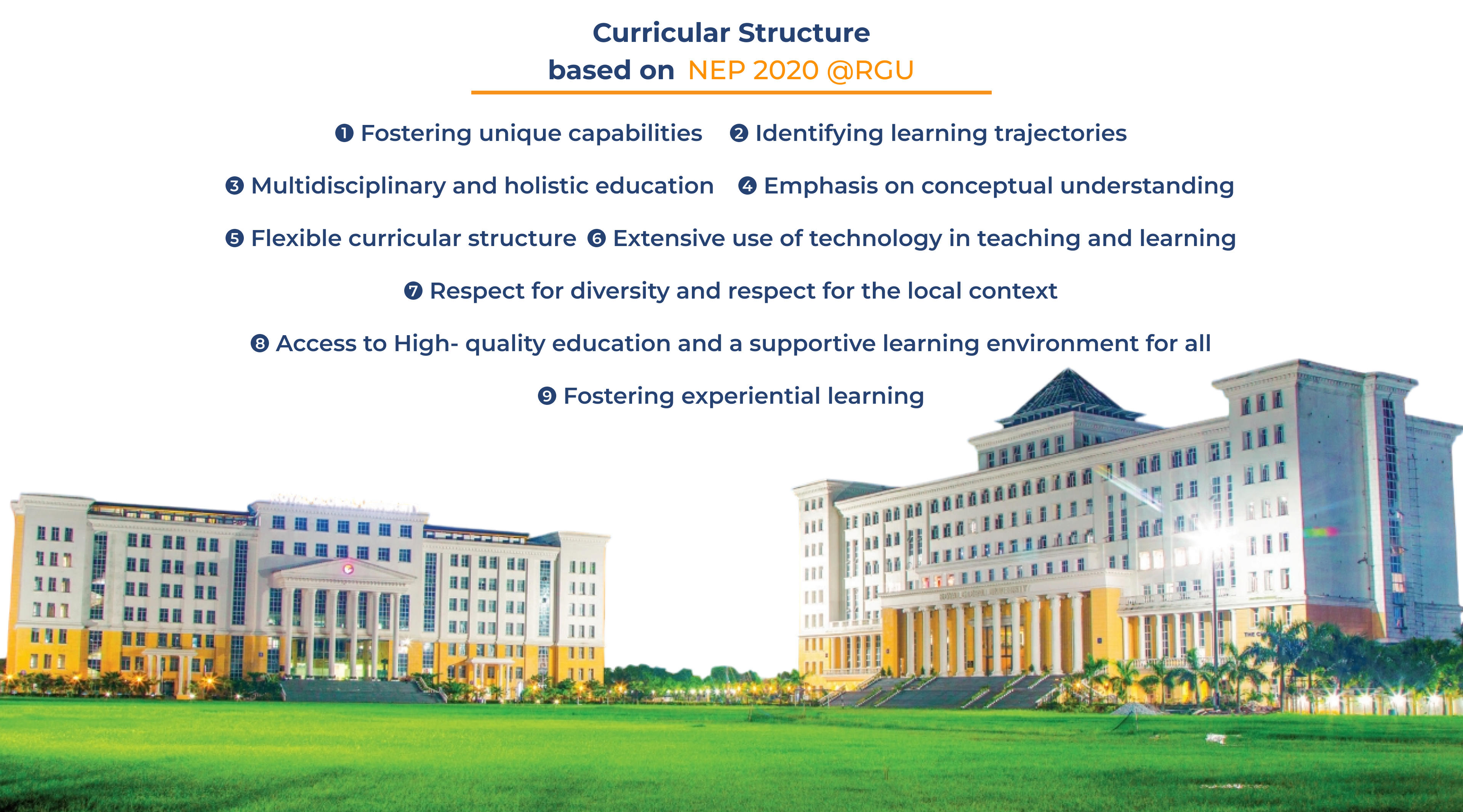Holistic education at the university level focuses on growing students’ minds while also supporting their emotions, social skills, values, and physical health. It helps students becoming well-rounded people, global citizens, and lifelong learners. Creating a holistic education environment requires a complete, well-planned strategy and approach.
Curriculum Design and Integration
A. Multidisciplinary Learning
- Multiple disciplines work on a common problem independently.
- Microbiology, Mass Communication, Computer Science are some examples of multidisciplinary courses.
B. Interdisciplinary Learning
- Different disciplines collaborate by sharing methods, theories, and perspectives to address a common problem.
- Offer minors and interdisciplinary elective courses from various fields, like Natural and physical sciences, Media sciences, mathematics and Computer Science, Commerce and Management etc
C. Value-Based Education
- Includes common courses or modules on ethics, community engagement and responsibility, leadership, and sustainable development.
D. Skill-Based and Experiential Learning
- Embed critical thinking, communication skill, problem-solving, and digital skill in the curriculum.
- Provide real world experiences such as internships, capstone projects, and field studies.
Supportive Teaching and Learning Practices
- Encourage active learning through flipped classrooms, project-based learning, and collaborative work.
- Adopt teaching methods to accommodate diverse learning styles and needs.
- Create strong mentorship programs where faculty members guide students in academics, help to inculcate emotional intelligence and counsel along career goals.
Co-Curricular and Extra-Curricular Activities
- Support student clubs for arts, debates, environmental issues, business ideas, and cultural events.
- Encourage leadership and teamwork through organizing events and competitions.
- Devote in sports, yoga, mindfulness sessions, and physical fitness programs.
- Organise workshops/invited talks on mental health, nutrition, and stress management.
Campus Environment and Infrastructure
- Recreational spaces of the University encourage openness, introspection, dialogue, and inclusivity.
- Provide support centres for health and wellbeing, counselling, and conflict resolution.
- Implement eco-friendly practices like waste segregation, zero single use plastic campus.
- Offer experiential learning through sustainability projects.
Community Engagement and Global Exposure
- Integrate community service opportunities into degree programs.
- Collaborate with NGOs and adopted villages for outreach programs.
- Foster respect and appreciation for different cultures through events.
Assessment and Feedback Mechanisms
- Evaluate student’s emotional growth, leadership skills, and community involvement.
- Gather feedback from students, teachers, and other stakeholders to keep improving the holistic education approach.
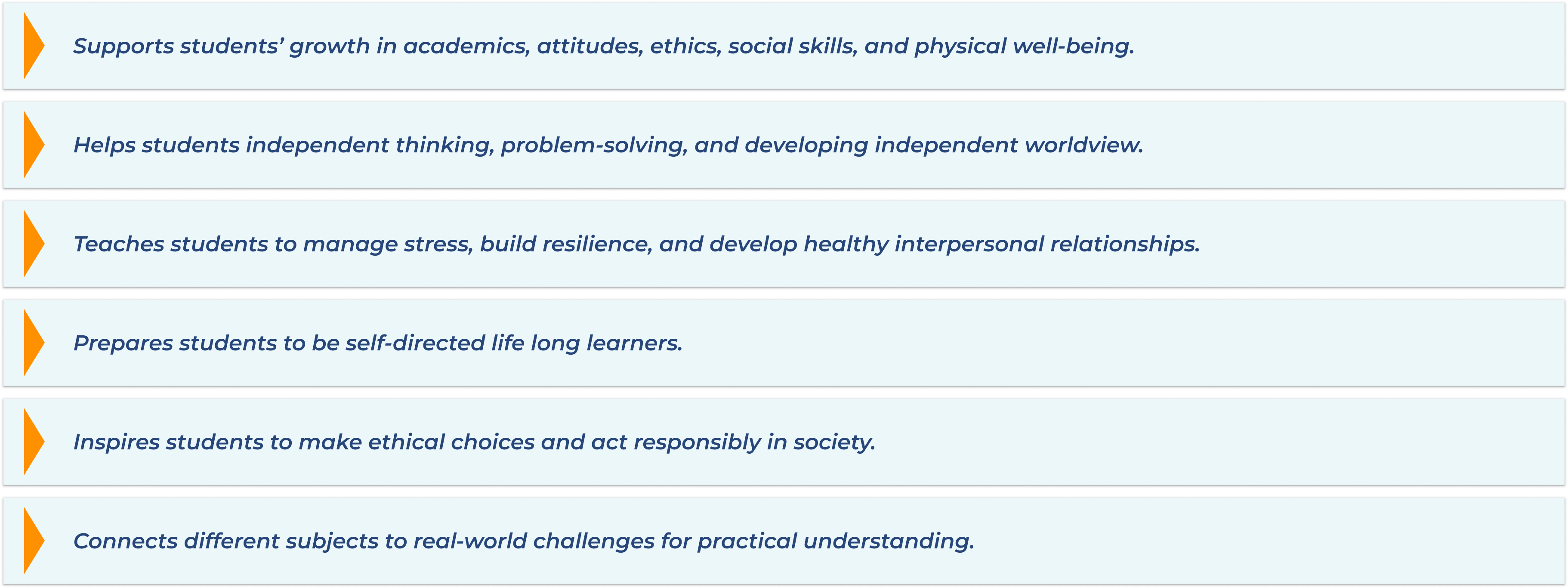
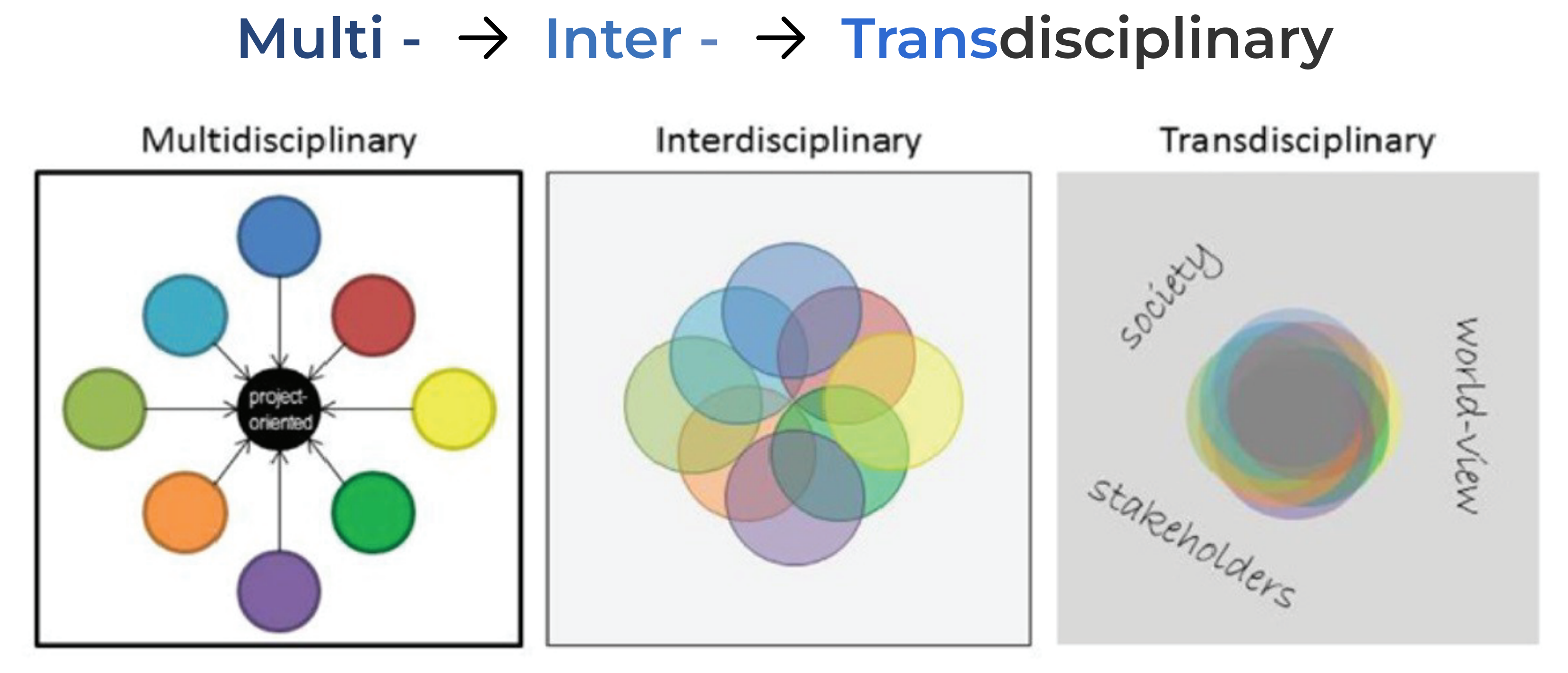
The Assam Royal Global University introduced the Four-Year Undergraduate (FYUG) Programmes from the Academic Year 2023-24 in alignment with the National Education Policy (NEP) 2020. These programs focus on providing students with a flexible, choice-based credit system and a multidisciplinary approach to education. At RGU, all undergraduate programs (except those regulated by specific professional councils) are structured with a combination of compulsory and elective courses to ensure a well-rounded education and fulfill degree requirements.
| Courses | Minimum Credit Requirements | |
|---|---|---|
| 3 Years Degree Course | 4 Years Degree Course | |
| Major (Core) | 60 | 80 |
| Minor | 24 | 32 |
| Interdisciplinary | 09 | 09 |
| Ability Enhancement Courses (AEC) | 08 | 08 |
| Skill Enhancement Courses (SEC) | 09 | 09 |
| Value Added Courses (VAC) | 06 | 06 |
| Internship | 04 | 04 |
| Research Project/Dissertation | NA | 12 |
| Total Credits | 120 | 160 |
One Course per semester to be studied through swayam up to 6th semester.
Award of Degree and @ Credit Structure
| Courses | Year | Credits to Earn | Additional Credits |
|---|---|---|---|
| UG Certificate | After 1st Year | 40 | 4 |
| UG Diploma | After 2nd Year | 80 | 4 |
| UG Degree | After 3rd Year | 120 | x |
| 4 Yers UG Degree (Honours) | After 4th Year | 160 | x |
| 4 Yers UG Degree (Honours with Research) | After 4th Year | 160 | Students who secure cumulative 75% marks and above in the first six semesters |
Semester - Wise
Credit Distribution For FYUGP
In Conformity With The National Credit Frame Work
| Course Credits | |||||||||
|---|---|---|---|---|---|---|---|---|---|
| Semesters | Major | Minor | IKS/IDC | AEC | SEC | VAC | SI | Research Project/ Dissertations | Total |
| I | 6 | 3 | IKS-I-3 | 2 | 3 | 3 | 0 | 0 | 20 |
| II | 6 | 3 | IKS-II-3 | 2 | 3 | 3 | 0 | 0 | 20 |
| III | 8 | 4 | IDC-3 | 2 | 3 | 0 | 0 | 0 | 20 |
| IV | 12 | 6 | 0 | 2 | 0 | 0 | 0 | 0 | 20 |
| V | 12 | 4 | 0 | 0 | 0 | 4 | 0 | 0 | 20 |
| VI | 16 | 4 | 0 | 0 | 0 | 0 | 0 | 0 | 20 |
| VII | 16 | 4 | 0 | 0 | 0 | 0 | 0 | 0 | 20 |
| VIII | 4 | 4 | 0 | 0 | 0 | 0 | 0 | 12 | 20 |
| Total | 80 | 32 | 9 | 8 | 9 | 6 | 4 | 12 | 160 |
| Courses | 17 | 8 | 3 | 8 | 3 | 2 | 1 | 1 | |
Common Courses
To ensure a well-rounded education, The Assam Royal Global University includes Common Courses in its curriculum. These courses are designed to enhance students’ foundational skills and prepare them for academic, professional, and social success.
Ability Enhancement Courses (AEC)
The Ability Enhancement Courses (AEC) focus on developing essential skills that are crucial for academic and professional growth. AEC consists of two key courses:
01. Communicative English
This course helps students develop strong language skills, including critical reading, effective writing, and business communication. The course emphasizes language as a tool for knowledge and identity, ensuring that students can communicate effectively in diverse environments
02. Behavioural Science
This course focuses on understanding human behaviour and attitudes in different situations, particularly in modern organizations. It helps students improve their decision-making, emotional intelligence, and interpersonal skills, preparing them to navigate social and professional challenges effectively.
| Semesters | Name of the Courses (Papers) | Credits |
|---|---|---|
| I | Communicative English – I: Introduction to Effective Communication | 1 |
| Behavioural Sciences -I | 1 | |
| II | Communicative English – II: Approaches to Verbal and Non-Verbal Communication | 1 |
| Behavioural Sciences -II | 1 | |
| III | Communicative English – III: Fundamentals of Business Communication | 1 |
| Behavioural Sciences -III | 1 | |
| IV | Communicative English – IV: Employability and Communication | 1 |
| Behavioural Sciences -IV | 1 | |
| 8 Courses (Papers) | 8 | |

Indian Knowledge System
As part of the Four-Year Undergraduate Programmes (FYUGP), students are encouraged to take courses in the Indian Knowledge System (IKS) to ensure a well-rounded understanding of India’s rich intellectual traditions. The total credits earned from IKS courses should amount to at least 5% of the total mandated credits:
8 credits for a 4-year UG programme
6 credits for a 3-year UG programme
Under the NEP 2020 Course Structure, All Students Will be Required to Enroll in
- Introduction to Indian Knowledge System - I (3 Credits) (Semester I)
- Introduction to Indian Knowledge System - II (3 Credits) (Semester II)
These courses introduce students to India’s diverse intellectual heritage, covering areas such as philosophy, science, arts, literature, and traditional knowledge systems. By integrating IKS into the curriculum, RGU ensures that students gain a deeper appreciation of India’s contributions to global knowledge and innovation while also fostering a multidisciplinary approach to education.

Elective Courses
To provide students with greater academic flexibility and practical skills, The Assam Royal Global University offers Elective Courses, which include Minor Courses and Skill Enhancement Courses (SEC).
01. Minor Courses: (Disciplinary/ Interdisciplinary)
There are two kinds of Minor courses available
Disciplinary Minors: Disciplinary minor courses focus on a single academic field, providing in-depth knowledge within that area. These courses offer a detailed understanding of the chosen subject area. For example, a students of B. Com will study minors from the track “Commerce and Management” which includes-Business Economics, Strategic Business Leader, Digital marketing, Rural Development, Portfolio Management etc
Interdisciplinary Minors: Interdisciplinary minor courses, on the other hand, combine knowledge and perspectives from multiple disciplines to address complex issues, offering a broader understanding.
Key Features of Minor Courses:
- Optional, but beneficial for academic and professional development.
- Usually pursued alongside the main degree program.
- Enhances career opportunities by adding diversity to a student’s skill set.
- Encourages interdisciplinary learning.
- There are 36 different tracks available under Minor Courses like Communication and Media, Management, Psychology, Information Technology, English Literature, History, Economics, Biotechnology, Physiotherapy etc. All departments of RGU offer at least one minor track for the students from other disciplines.
Students have the flexibility to choose Minor Courses from different disciplines or interdisciplinary fields alongside their major. These courses allow students to gain additional expertise in a subject area beyond their primary field of study. A student qualifies for a minor by completing the required number of courses in a particular discipline or interdisciplinary area. Students can explore various options before declaring their minor at the beginning of the first semester. This structure enables a broader learning experience, fostering multidisciplinary knowledge and diverse career opportunities.
02. Skill Enhancement Courses
All departments design these courses as per the students’ needs and available institutional resources.
Key Features of Skill Enhancement Courses:
- Focus on practical and employable skills.
- Involve hands-on training, projects, and assessments.
- Bridge the gap between academic knowledge and industry requirements.
- Improve students’ confidence and competence in specific areas of required skill.
Types of Skill Enhancement Courses:
- Professional/Technical Skills: Python, JavaScript, Web Development, Microsoft Excel, Machine Learning, Cybersecurity, Networking, Tally etc.
- Creative Skills: Photoshop, Illustrator, Video Editing, Photography etc.
- Soft Skills & Communication: Public Speaking, Leadership & Team Management, Negotiation & Conflict Resolution, Emotional Intelligence, Time Management & Productivity.
- Language & Communication: Technical writing, Creative Writing, Blogging etc.
- Entrepreneurship & Business: Business Strategy, Startup Fundamentals, E-commerce, Digital Marketing etc.
- Personal Development: Stress Management, Decision Making & Critical Thinking, Personal Finance.
Skill Enhancement Courses (SEC) focus on practical skills, hands-on training, and soft skills to enhance students' employability and industry readiness. These courses are aligned with the student's major discipline until Semester III to bridge the gap between theoretical knowledge and practical application, equipping students with essential competencies for professional success. For example, students majoring in English may choose from SEC courses such as Public Speaking, Creative Writing, Text Editing, Translation & Editing and Content Writing
Value Added Courses
Value Added Courses (VAC) are designed to broaden students' perspectives and enhance their knowledge beyond their core subjects. These courses focus on key areas that contribute to holistic education, personal development, and employability. The VAC curriculum is categorized into four major areas:
Area-I
Understanding India
These courses help students develop a deep understanding of contemporary India, emphasizing its historical foundations, national development policies, constitutional values, and fundamental rights and duties. The objective is to instill civic awareness and responsibility, ensuring that students appreciate the country’s diverse socio-political and cultural framework.
Area-II
Environment Science & Education
This category focuses on environmental awareness and sustainability. Students will learn how to apply knowledge, skills, and values to address environmental challenges and take responsible actions to mitigate environmental degradation. The goal is to prepare students to contribute to a more sustainable and ecologically balanced future.
Area-III
Digital And
Technological Solutions
This course introduces students to modern technologies like Artificial Intelligence (AI), 3-D machining, big data analysis, machine learning, drone technologies, and deep learning. These technologies are becoming increasingly important in fields like healthcare, environmental protection, and sustainable living. By learning these skills, students can improve their problem-solving abilities, increase their career opportunities, and stay prepared for future technological advancements. The goal is to make students comfortable with using technology in real-life applications, making them more employable and adaptable in the digital world.

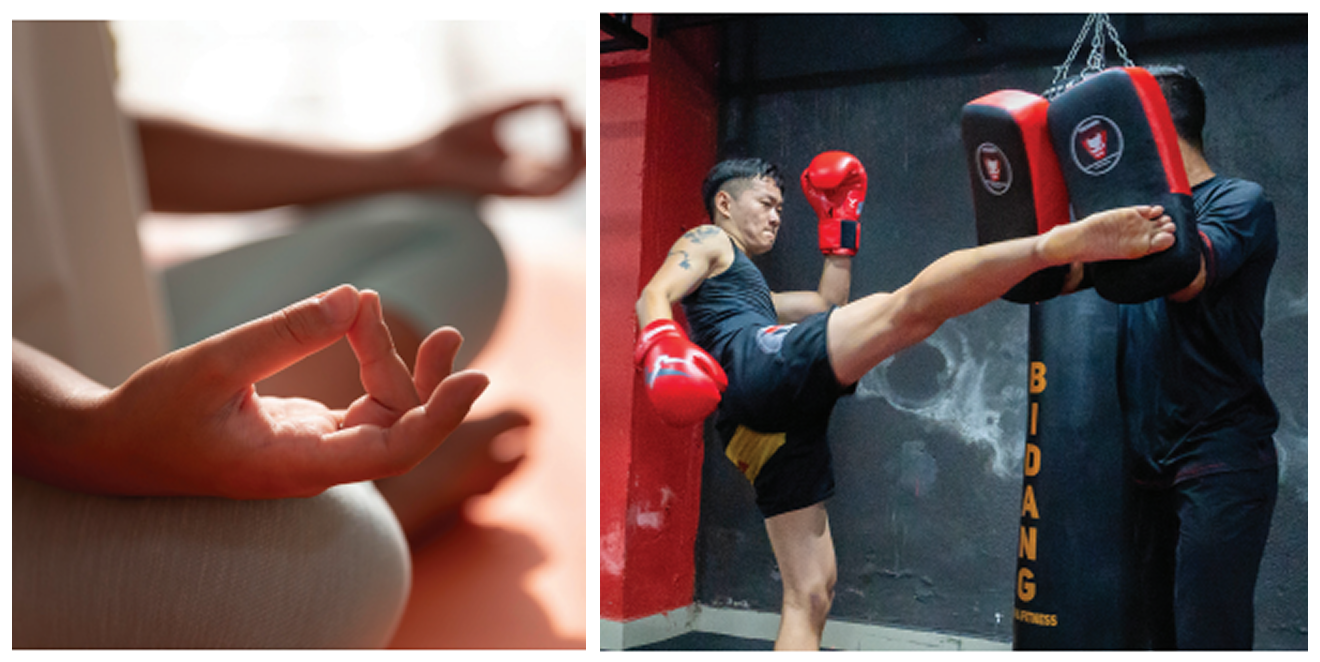
Area-IV
Health & Wellness,
Yoga Education, Sports, and Fitness:
This course focuses on helping students maintain a healthy lifestyle through activities like sports, yoga, and fitness training. Students will learn how to take care of their bodies and minds, manage stress, and develop self-discipline. Sports and fitness activities will be conducted outside regular class hours to encourage students to stay active. Yoga education will help students build mental strength, self-control, and inner peace, making them better prepared to handle life’s challenges. The aim is to ensure that students lead a balanced life, staying fit both physically and mentally while also learning the importance of teamwork, leadership, and self-care.
Interdisciplinary and multidisciplinary courses are designed to offer a broader and more holistic education at the undergraduate level. These courses allow students to connect their major area of study with other disciplines, enriching their learning experience and enhancing their knowledge across multiple fields. Under the National Education Policy (NEP) 2020, undergraduate education encourages a blend of humanities, arts, and STEM (Science, Technology, Engineering, and Mathematics) to promote critical thinking, creativity, problem-solving, teamwork, communication skills, and social awareness. This approach leads to better learning outcomes, innovation, and a deeper understanding of various subjects. As part of the curriculum, students enrolled under the NEP 2020 framework (Batch 2023 onwards) must complete at least one interdisciplinary or multidisciplinary course of their choice. Each department at RGU has developed multidisciplinary/interdisciplinary courses, offering students an opportunity to explore subjects beyond their major discipline. However, students cannot choose or repeat courses that they have already studied in their major or minor stream under this category. These courses are a part of liberal arts and science education, ensuring that students develop a well-rounded perspective and are equipped with cross-disciplinary knowledge that will benefit them in their careers and lifelong learning.
Areas of
Interdisciplinary/
Multidisciplinary
Courses @RGU
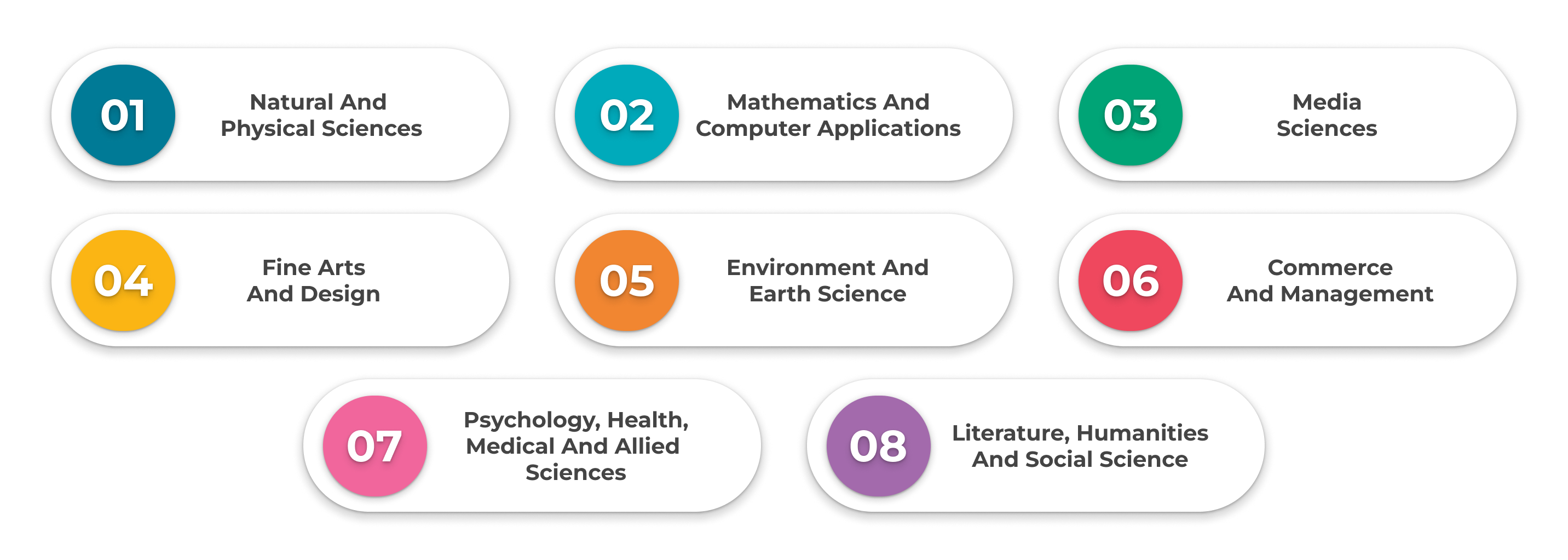
Integrating courses for Civil Services Examination (CSE) within the undergraduate (UG) curriculum represents a strategic and inclusive approach to higher education and career preparation. With the increasing aspiration among students to join the Indian civil services, offering formal, credit-bearing courses focused on UPSC preparation can make civil service coaching more accessible, structured, and academically rigorous.
The Assam Royal Global University has initiated this integrated programme along with Regular BA/B.Sc. Programmes (like- Geography, History, Sociology, Economics, Political science, Public Administration, Social Work, Chemistry, Physics, Mathematics etc).
Advantages:
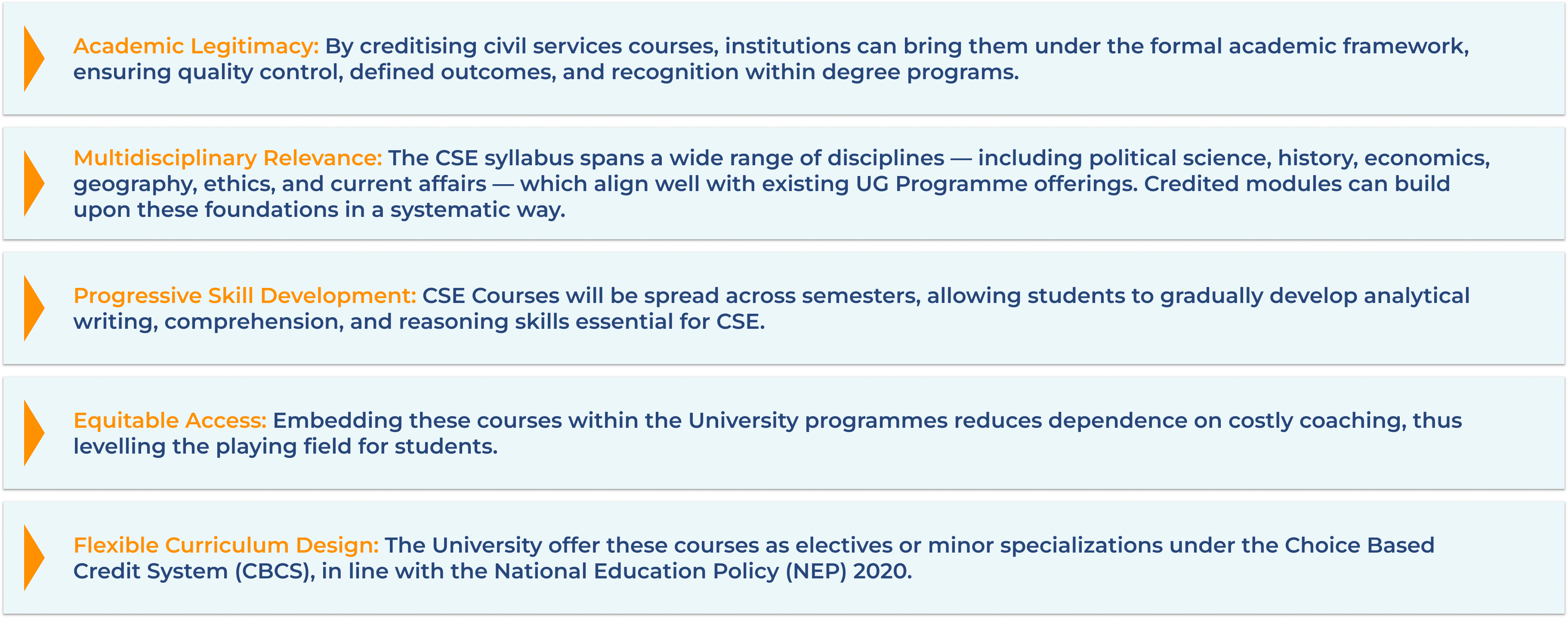
Introducing this integrated CSE courses at the UG level not only enhances employability and career preparedness but also strengthens the academic ecosystem by aligning it with national service goals. It promotes holistic development and encourages a wider, more inclusive pool of candidates to enter the civil services with a strong academic and ethical grounding.
The university’s coaching program for NET, SET, and GATE is tailored to assist students and research scholars in preparing for the National Eligibility Test (NET), State Eligibility Test (SET), and Graduate Aptitude Test in Engineering (GATE). These exams are pivotal for pursuing careers in academia, research, and engineering.
Benefits:
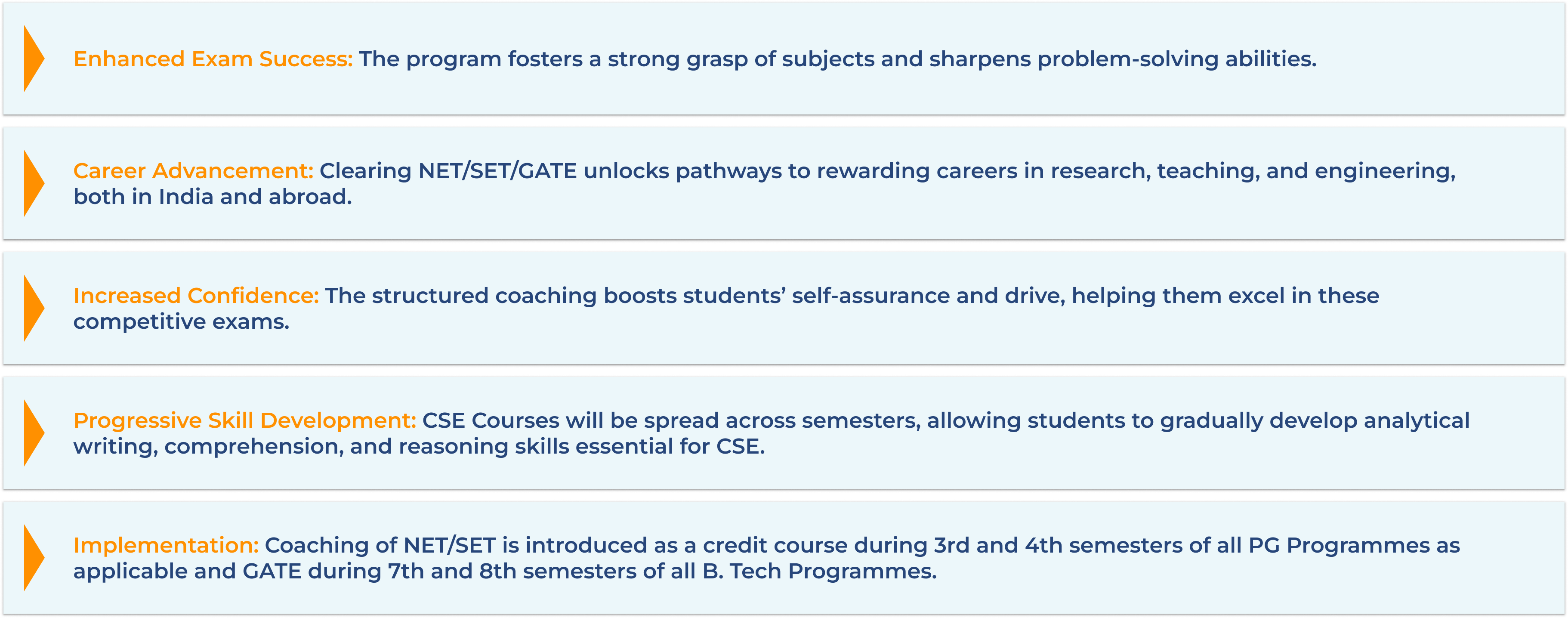
Who can benefit:
- Research Scholars
- Postgraduate Students
- Engineering Students
The university’s NET/SET/GATE coaching program is an essential resource for students and scholars striving to succeed in these competitive exams and advance their professional aspirations.
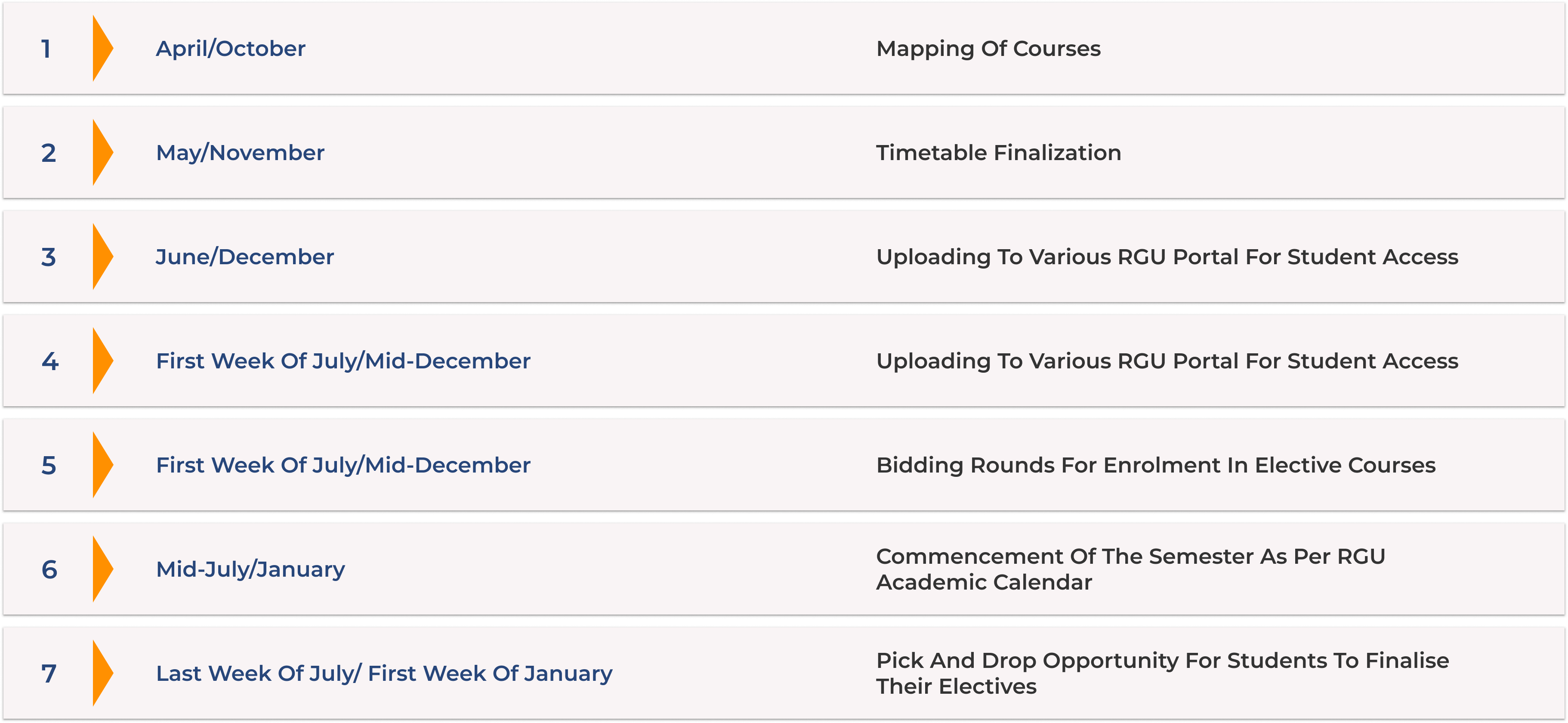
- 3D Modelling and Printing
- A
- Accounting Software
- Agricultural Practices in India
- Animal Parasites
- Aptitude and Quantitative Ability
- Art and Craft
- Ayurvedic Science of Food and Nutrition
- B
- Bakery and Confectionery
- Bamboo & Cane Crafts of North-East India
- Banking Practices
- Basic Analytical Chemistry
- Basic Creative Drawing
- Basic Food Processing
- Basic Instrumentation Skill
- Basic IT Tools
- Basic Life Support
- Basics of Accountancy
- Basics of Accounting
- Basics of Creative Painting
- Basics of Microsoft Excel
- Basics of Photography
- Basics of Physiotherapy
- Basics of Sports Science
- Basics of Tally
- Basics of Tour Operation and Ticketing
- Biochemical analysis of Blood
- Biochemical Analysis of Food
- Biochemical Applications in Forensics
- Biochemical assessment of food products
- Bio-fertilizer
- Budgeting and Budget Analysis
- Budgeting and Budget Implementation in India
- Business Tourism
- C
- Characters & Illustration
- City and Art
- Civil Engineering and Sustainable Growth
- Claymation
- Climate Change
- Climate Writing
- Clinical Laboratory Management
- Community Health and Social Work
- Comprehensive Healthcare
- Computer Application
- Computer Applications in Business
- Computer Fundamentals in Business
- Computer Networks and Design
- Computer Skill
- Constitutional Studies
- Constitutional Values and Fundamental Duties
- Creative Writing and Lexicography
- Cultural Heritage Tourism of India
- Cyber Space and Cyber Crime
- D
- Data Collection and Analysis
- Design Rendering & Digital Representation Technique
- Digital Marketing
- Disaster Management
- E
- Earth Sciences
- Ecosystem Degradation and Intervention
- Effective Writing
- Electrical Circuit and Network Skills
- Electoral System in India
- Elements of Design
- Emotional Intelligence
- English Language for Competitive Exams
- English Writing from Northeast India
- Environmental
- E-Tourism
- Event Management
- F
- Fashion Merchandising
- Fashion Styling
- Fermentation Technology and Application
- Field Geology
- Film & Media
- Financial Literacy
- First Aid
- Floriculture
- Food adulteration
- Food Hygiene and Handling Practices
- Food Product Development
- Foreign Language - French
- Form Studies
- Fundamentals of Forensic Science
- Fundamentals of Geology
- Fundamentals of Medicinal Chemistry
- Fundamentals of MLT
- G
- Gandhian Studies
- General Microbiology
- General Pathology Lab
- Graphic Design
- Graphic Design and Animation
- Guest Handling Skills in Hospitality
- H
- History of India from Ancient to Modern
- History of North-East
- Hospitality Operations
- Human Biology and Diseases
- I
- Illustration Techniques
- Image Editing and Animation
- Imagining Cities
- India: Land of Diversity
- Industrial and Food Microbiology
- Industrial Chemistry
- Intellectual Property Rights
- Interior Landscape
- Introduction to Apparel Construction
- Introduction to Archaeology; An Insight into India's Past
- Introduction to Cyber Security
- Introduction to Editing
- Introduction to Indian Art: An Appreciation
- Introduction to Microscopy and Histology
- Introduction to Museum and Museology
- Introduction to Photography
- Introduction to Python
- Introduction to Treatment
- IPR and Cyber Law
- IT tools in Management
- J
- Jewellery Design
- L
- Legal Literacy
- M
- Materials Chemistry
- Mathematical Programming Tools
- Medical Law and Ethics
- Medication Administration
- Microbial Quality Control in Water and Food
- Microbial Technology for Human Welfare
- Microbes in Sustainable Agriculture and Development
- Mushroom Cultivation and Processing
- Museology: Theory and Practice
- N
- News Presentation and Radio Jockey
- Nursery and Gardening
- O
- Ocular Anatomy Lab
- Ophthalmic Lens & Dispensing Optics Lab
- Open-Source Software
- Organic Farming
- Orientation Physiotherapy
- Orientation to Clinical Science
- P
- Patient Care Management
- Peace and Conflict Management
- Personal Finance
- Phytochemical Analysis and Drug Discover
- Physical Geography
- Physics and Chemistry of Earth
- Physics Workshop Skills
- Plant Ecology and Economic Botany
- Principles of Exercise Therapy
- Print Product
- Psychological Testing
- Psychology for Health and Well-being
- Public Health and Hygiene
- R
- Remote Sensing
- Research Methods
- Right to Information and Good Governance
- Rural Development
- S
- Science and Society
- Screenplay Writing
- Self and Society
- Sericulture
- Short Film Making
- Sketching
- Social Case Work/ Working with Individuals and Family
- Social Group Work
- Social Media Studies
- Social Work and NGO Management
- Sociology
- Sociology of Gender
- Socio-Economic Offences
- Statistical tools SPSS/R
- Study Tour, Report and Viva Voce
- Surgical Instrumentation
- Sustainable Product Development
- System Administration
- T
- TALLY
- Theatre and Stagecraft
- Thermal Physics
- U
- Understanding and Managing Mental Health
- Understanding of Life Processes
- V
- Vermicompost and Its Application
- Vermiculture
- Videography and Editing
- Visualisation Techniques
- W
- Windows Programming using C#
- Y
- Yoga - Philosophy and Practice

